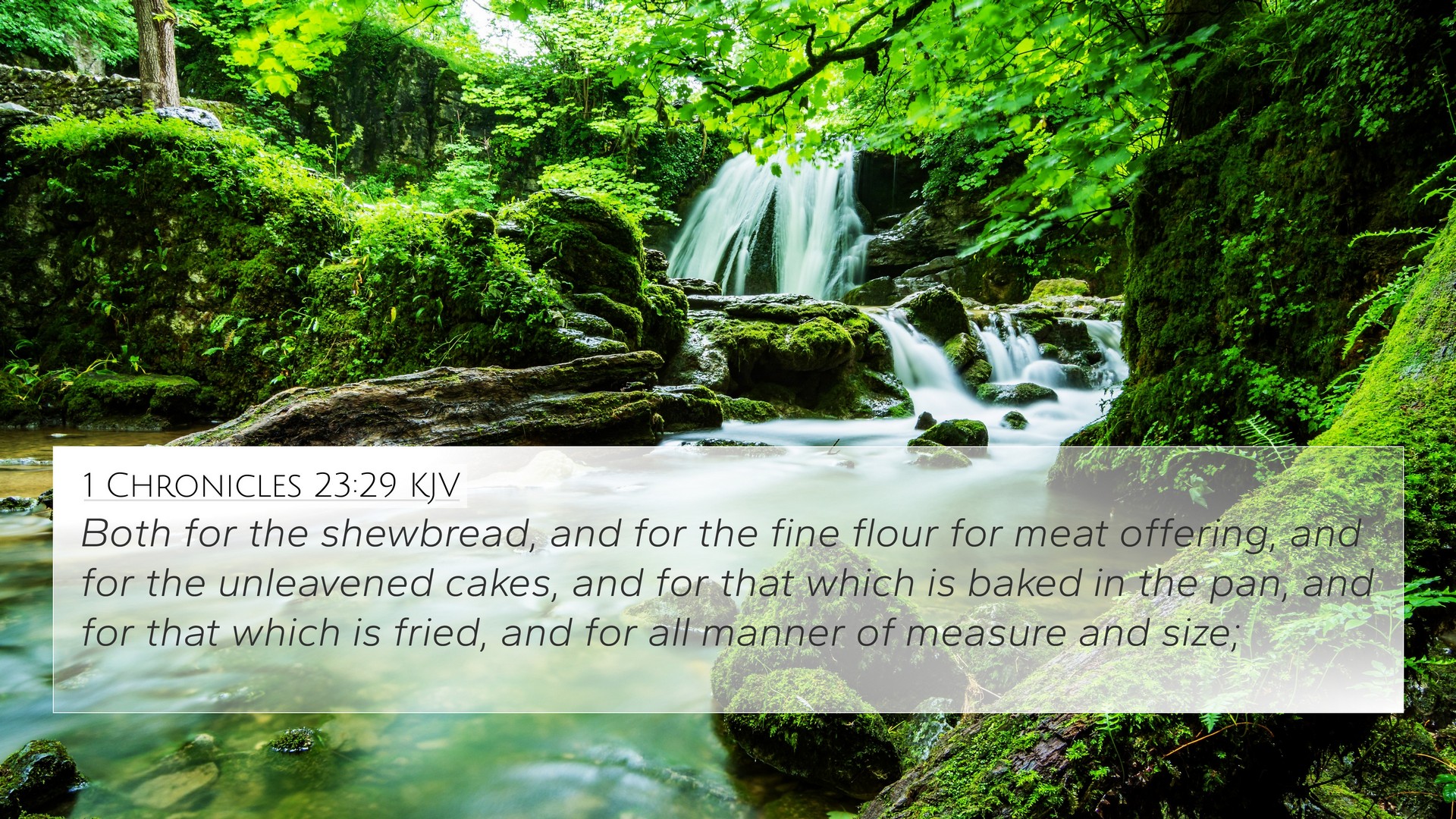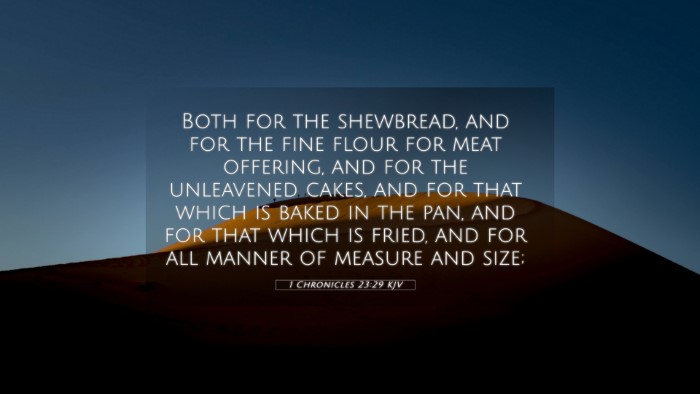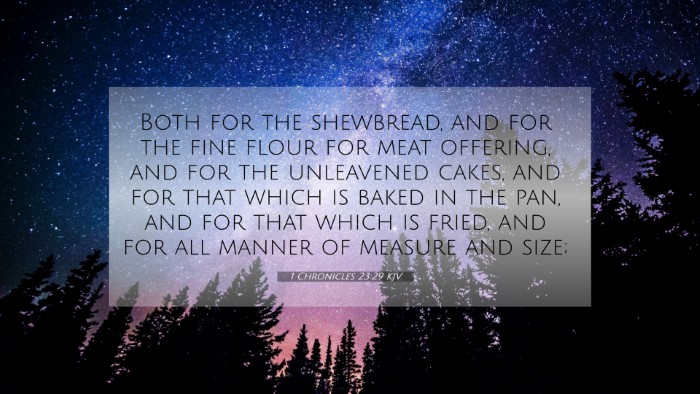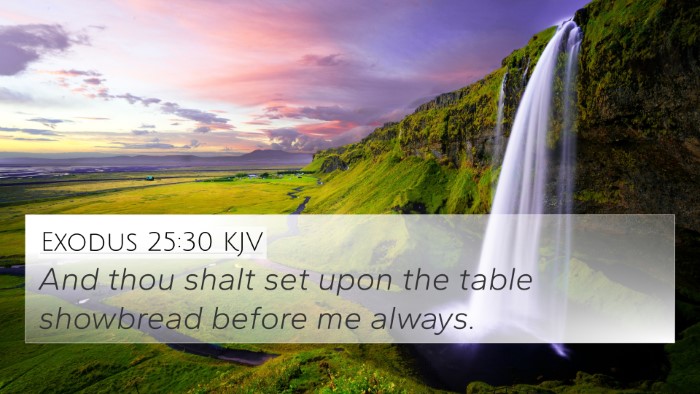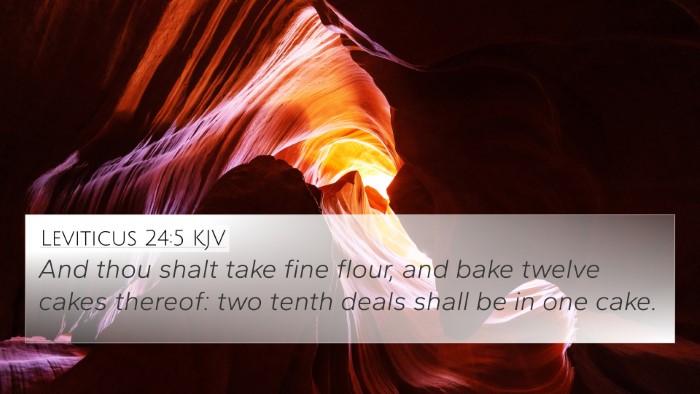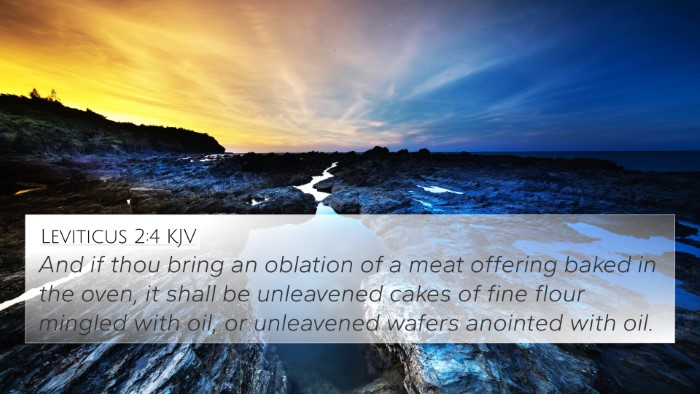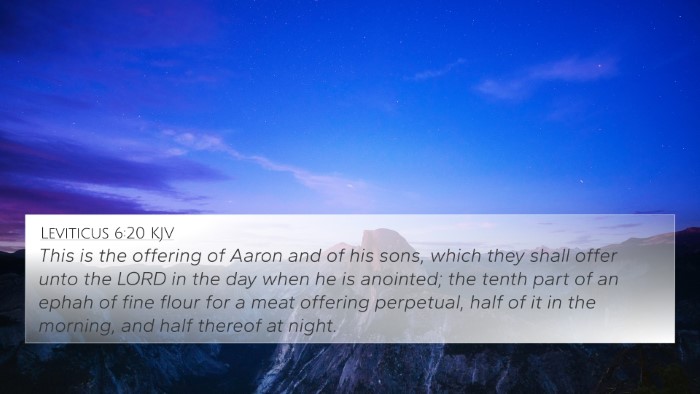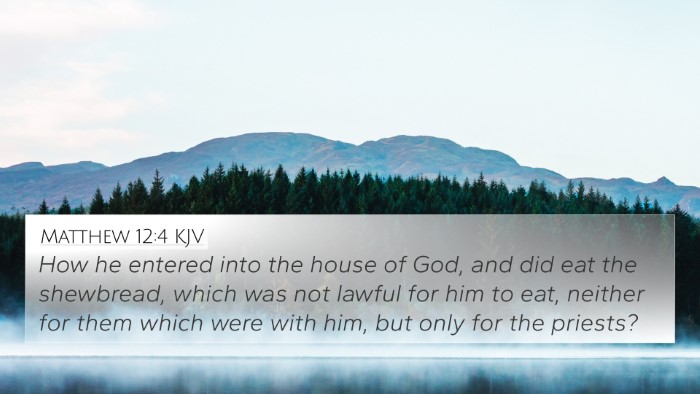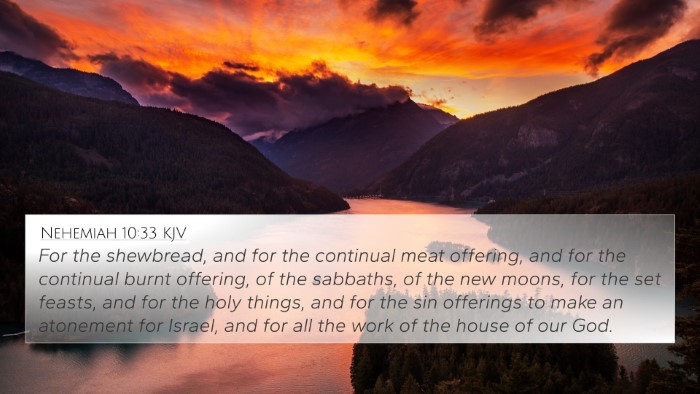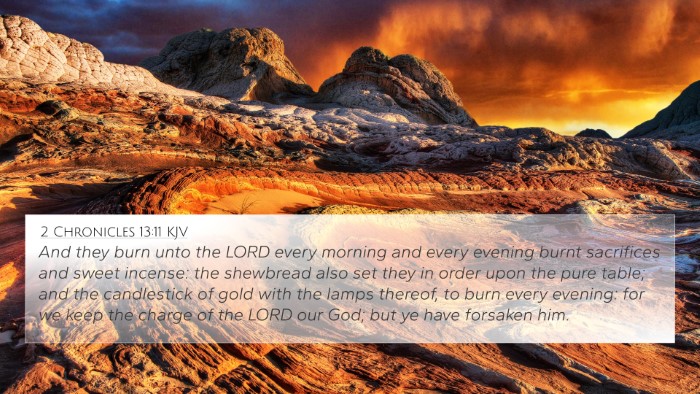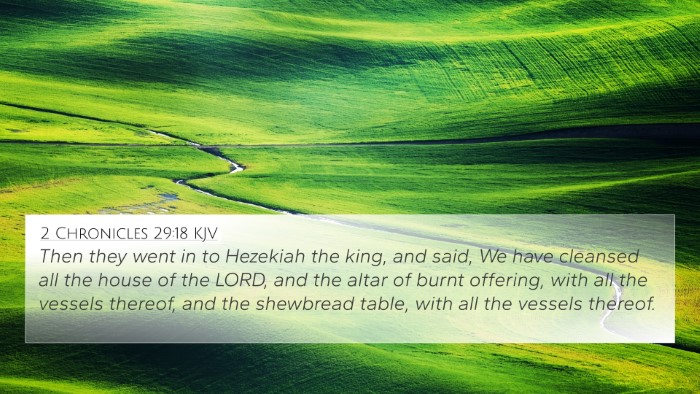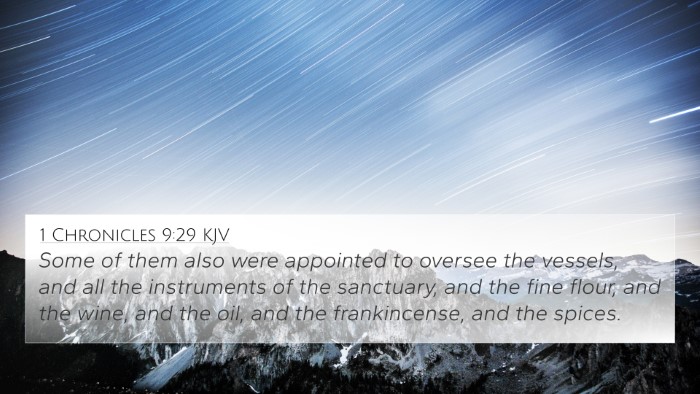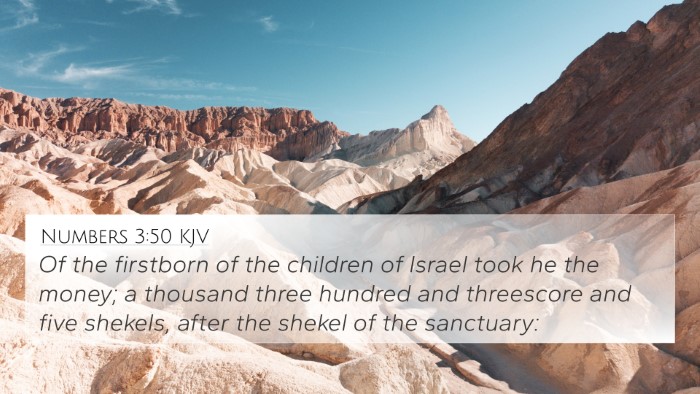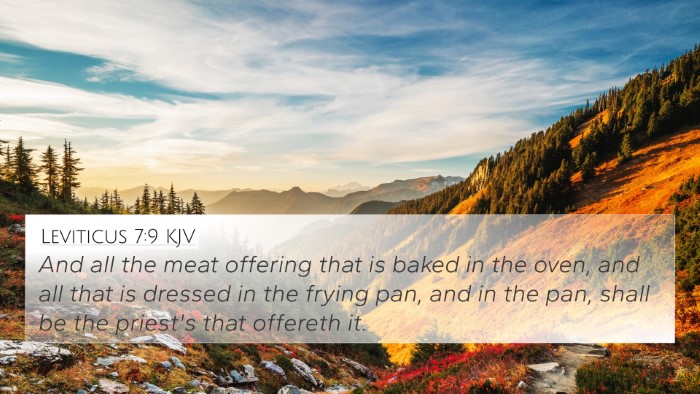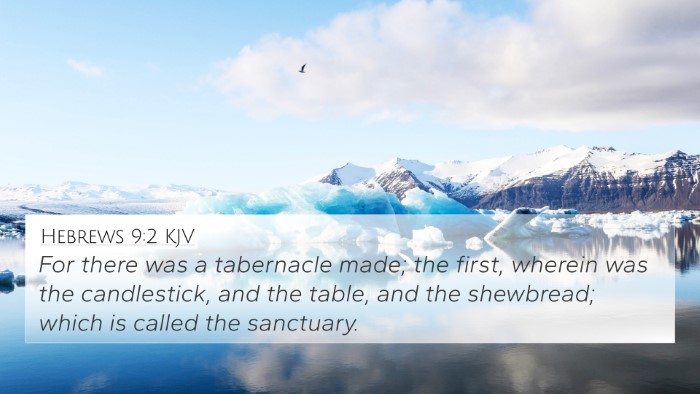Understanding 1 Chronicles 23:29
Bible Verse: 1 Chronicles 23:29 - “Both for the showbread, and for the fine flour for meat offering, and for the unleavened cakes, and for the fried things, and for all manner of measuring, and for the weights and for the bread of the offering.”
Commentary Insights
This verse is embedded within the context of the duties assigned to the Levites, particularly regarding their responsibilities in the temple service. The Levites' roles included overseeing the offerings that were vital to the worship and daily rituals of Israel.
Key Themes from Commentary
- Divine Order: The organization of worship and duties reflects God's order for His people. Matthew Henry emphasizes that such structure in worship signifies divine authority and intention.
- Importance of Offerings: This verse highlights the significance of bread offerings in the Israelite worship. Adam Clarke notes that the showbread served as a continual reminder of God’s provision and faithfulness.
- Symbolism of Bread: Bread often symbolizes life and sustenance in biblical texts. Albert Barnes translates this insight to show that the offerings symbolize the spiritual sustenance that God provides.
- Measurement and Accountability: The mention of measuring and weights indicates a principle of fairness and accountability in offerings. This reflects the biblical theme of justice in worship practices.
Bible Verse Cross-References
The following scriptures provide a deeper understanding of the themes in 1 Chronicles 23:29:
- Leviticus 24:5-9 - Discusses the preparation and significance of the showbread as part of offerings to God.
- Exodus 25:30 - Refers to the command to put showbread on the table before God, indicating its importance in worship.
- 1 Corinthians 10:16-17 - Draws parallels to the communion bread in Christian worship, linking Old Testament practices with New Testament symbolism.
- Hebrews 9:2 - Mentions the showbread table as part of the true heavenly sanctuary, showcasing how earthly rituals reflect divine things.
- Matthew 4:4 - Jesus’ words that man does not live by bread alone connect physical sustenance with spiritual sustenance, affirming the importance of God’s word.
- Psalm 104:15 - Celebrates God’s provision of food and sustenance, resonating the theme of nourishment found in the offerings.
- John 6:35 - Jesus identifies Himself as the bread of life, reinforcing the theme of sustenance and spiritual nourishment.
- Malachi 1:7 - Condemns the offerings of Israel, reflecting on the importance of honoring God with proper sacrifices.
- Acts 6:4 - Shows the early church’s dedication to the ministry of the word and prayer, linking the principle of spiritual service to offerings in worship.
- Romans 12:1 - Speaks of presenting our bodies as living sacrifices, highlighting the connection between the Old Testament sacrifices and New Testament worship.
Connections Between Related Scriptures
The cross-references above illustrate the inter-Biblical dialogue that connects temple practices with New Testament worship. Each reference enriches understanding of how physical acts of worship translate into spiritual truths.
Thematic Bible Verse Connections
Notable themes emerging from 1 Chronicles 23:29 include:
- Provision: Both bread and offerings symbolize God's provision for His people.
- Duty: The responsibilities of the Levites show the importance of dedication in worship settings.
- Measurement and Justice: The practices concerning weights and measures underline the principles of equity in religious offerings.
- Spiritual Nourishment: The ongoing theme of bread as a metaphor for spiritual life and sustenance.
Bible Study Methods for Cross-Referencing
When diving deeper into the study of Scripture, consider employing these methods for effective cross-referencing:
- Bible Concordance: Utilize a concordance to locate specific words and their occurrences throughout scripture for thematic studies.
- Bible Cross-reference Guides: These resources help trace topics and concepts across different Bible books.
- Comparative Studies: Examine passages in parallel to understand their context and the relationships among them.
- Chain References: Follow a chain of verses that elaborate on a specific theme or concept.
This combined understanding facilitates richer biblical study, highlighting the interconnectedness of scriptures while also emphasizing the continual relevance of Old Testament practices in light of New Testament fulfillment.
Conclusion
In conclusion, 1 Chronicles 23:29 opens a window into the structured worship of the Israelite community and establishes crucial parallels to modern Christian practices. By engaging in comparative Bible verse analysis and thorough cross-referencing, believers can find deeper theological insights that bridge the entirety of Scripture.
